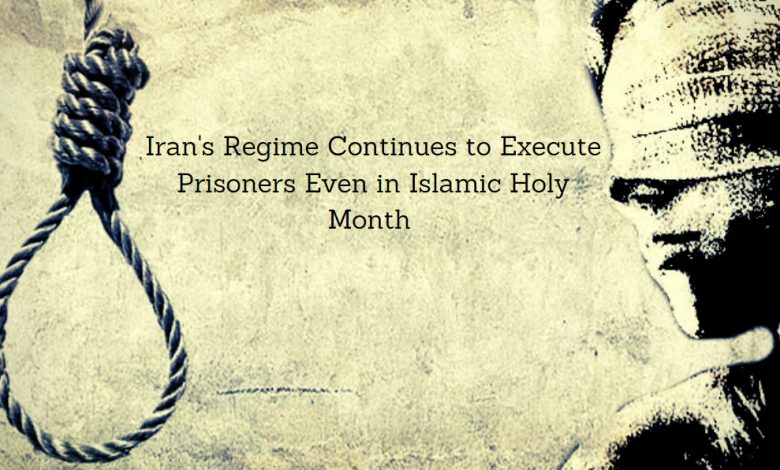IRAN: World Day Against Death Penalty

Written by Staff Writer
October 10th marked the World Day against the Death Penalty. For citizens of countries with governments fixated with implementing this cruel and inhuman punishment, it is a reminder that despite being will into the 21st century, there is still a long way to go before leaving behind this medieval punishment for good.
Iran under the medieval mullahs is a prime example of such a mentality. By scratching the surface and getting a little deeper, for Iran’s rulers, it is not just a mere form of punishment. It is an instrument of spreading fear and intimidating among citizens.
For the mullahs in Tehran, hanging is a means to an end. It is only used to contain enraged citizens, reminding them that dissent will have dire consequences.
The Iranian regime began mass executions in the very first two years after its inception when in 1981 and 1982 it executed Iranian dissidents by thousands. Those who survived rightfully called that decade, the “Dark Era.”
NCRI-FAC
✔
@iran_policy
Iran’s 1988 massacre of 30,000 political prisoners is an “ongoing crime against humanity”. 31 years on, the perpetrators are in government & families of victims continue to be tormented. It’s high time for @UNHumanRights to investigate the #1988Massacre.https://www.ncr-iran.org/en/news/human-rights/26639-paris-remembers-iran-s-1988-massacre-urges-un-action-to-stop-the-ongoing-crime-against-humanity …
Embedded video
221
09:54 – 2 Sep 2019
Twitter Ads information and privacy
239 people are talking about this
The highlight of the first decade into the regime’s rule was, of course, the bloody summer of 1988 when more than 30,000 political prisoners were tried in Kangaroo courts and immediately send to gallows. The majority were members and supporters of the main Iranian opposition, Mujahedin-e Khalq (PMOI/MEK).
It is a fact that the main target of Revolutionary Guards (IRGC) and the security forces were their main rival, the MEK. The massacre of political prisoners was a turning point in the bloody 40-year history of the regime. No Iranian will ever forget or forgive what amounts to the worst crime against humanity in post-World War II. As Amnesty International wrote last summer, the statute of limitations does not apply to such crimes.
It is only after it perpetrates are hauled before an International criminal court, as a reminder for future generations, that this case will be put to rest. It took 28 years before the Iranian Resistance opened the case with a call from Mrs. Maryam Rajavi, President-elect of the National Council of Resistance (NCRI), for a worldwide campaign on behalf of the fallen heroes of 1988. It was named the “Campaign for Justice.”
“Death Commission”
The summer of 1988 was the bloodiest and as described by Khomeini’s then successor, Ayatollah Hossein-Ali Montazeri, the “greatest crime committed in the history of the Islamic Republic.” Khomeini hastily put together a four-member committee to exterminate all political prisoners.
In the shocking audiotape, Montazeri can be heard telling a meeting of the “Death Commission” members in August 1988 that they are responsible for a crime against humanity. He said: “The greatest crime committed under the Islamic Republic, for which history will condemn us, has been committed by you. Your names will in the future be etched in the annals of history as criminals.”
NCRI-FAC
✔
@iran_policy
A second Iranian regime official has admitted to the #1988massacre of 30,000 political prisoners in Iran.https://www.ncr-iran.org/en/news/human-rights/26534-second-official-admits-to-iran-s-1988-massacre-of-mek-political-prisoners …
View image on Twitter
56
22:13 – 31 Jul 2019
Twitter Ads information and privacy
64 people are talking about this
His son Ahmad finally showed the courage to release an audiotape of his father’s encounter with members of the “Death Commission” in August 2016. The commission oversaw the massacre of political prisoners in the summer of 1988.
Montazeri, the handpicked successor of Khomeini, was sacked for his public objections to mass executions in 1988. He spent the rest of his life under house arrest and died in 2009.
Mostafa Pour-Mohammadi, maybe the most shameless of the four members of the “Death Commission”, has since admitted his role in the massacre and boasted that he was proud to “carry out God’s verdict and has not lost sleep over what he did.” He was a member of the “Commission” in the summer of 1988. Pour-Mohammadi was Hassan Rouhani’s Justice Minister in his first cabinet and was then promoted to special adviser to the head of mullahs’ Judiciary, Ebrahim Raisi, who was another member of the Commission.
On the anniversary of World Day against the Death Penalty, the President-elect of the Iranian opposition, Maryam Rajavi reminded the world that Raisi had promoted by Ali Khamenei to be the Judiciary Chief. She also said that international bodies have reported 253 executions in Iran in 2018 alone.
She added that this is but a small part of the actual number since many of the executions in Iran are carried out secretly. There were at least four male and female juveniles among those executed for the crime they had committed as minors. They reached 18 while they were on the death row.
Maryam Rajavi
✔
@Maryam_Rajavi
The time has come for the international community to end three decades of impunity for the clerical regime leaders in #Iran and to hold them accountable for their crimes. #1988Massacre https://www.maryam-rajavi.com/en/item/maryam-rajavi-1988-massacre-iran-perpetrators-tried …
Embedded video
421
15:11 – 24 Aug 2019
Twitter Ads information and privacy
451 people are talking about this
Mrs. Rajavi emphasized that in the same period, the number of political executions has increased, remarkably.
Last June, in a criminal plot by prison authorities, a political prisoner was viciously murdered in Fashafouyeh (Greater Tehran) Prison. In July and August, three prisoners were executed in Dezful and Kazerun. And last November, Amnesty International reported the secret executions of 22 Arab compatriots.
Let’s hope that before another World Day Against Death Penalty is upon us, the mullahs’ regime is overthrown and the perpetrators of the crime against humanity are brought to justice.

